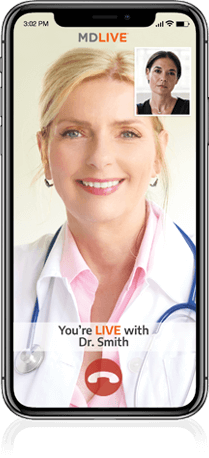Spring brings blooming trees, warmer winds, and loads of pollen. If you have allergies, and many of us do – it’s the sixth leading cause of chronic illness in the U.S.1 – the sneezing, runny nose, and puffy eyes are telltale signs that pollen is in the air.
Seasonal allergy symptoms, known as hay fever, often peak during spring, summer, and fall when pollen counts are high. On the other hand, perennial allergies persist year-round and are caused by sensitivity to allergens like dust mites, pet dander, insect dust, or mold. Both seasonal and perennial allergens trigger allergic rhinitis.
Allergy symptoms (allergic rhinitis) are among the most common conditions MDLIVE doctors treat, so we asked Dr. Vontrelle Roundtree, MDLIVE Clinical Medical Director, to share her advice on what causes allergies and treatment options for nagging or worsening symptoms.
- 1https://www.aafa.org/allergy-facts/
Get the facts on allergies.
If allergies are getting the best of you, here is Dr. Roundtree’s advice on allergy triggers, tips to relieve symptoms, and how to get fast, reliable care from the comfort of home.
What causes allergic rhinitis (allergy symptoms)?
Common symptoms of allergies.
Allergy symptoms can vary from mild to severe. Still, most people will say they feel “congested,” which can be an uncomfortable symptom that impacts your day-to-day activities, energy, and sleep. Some of the most common symptoms are:
Because you can develop allergies to anything and symptoms can easily be confused with other illnesses, a doctor can evaluate whether you’re suffering from allergies or something else, help you manage symptoms, and recommend tests or treatments.
Dr. Roundtree’s perspective – allergies, cold, or COVID-19?
“When it’s hard to breathe, and you feel congested in your nose and head, it’s not always easy to tell what’s going on. Because COVID-19 variants cause symptoms that overlap with colds, flu, allergies, and asthma, a doctor can help determine the cause and best treatment and get you feeling better faster. If your symptoms are familiar and return each year at the same time, you likely have seasonal allergies. But if your symptoms are new or over-the-counter remedies are no longer working, you should see a doctor to help determine the root of the problem.”
Knowing your triggers.
While pollen is one of the most common allergens, dust mites, mold, and animal dander are also common triggers for allergic reactions. Keeping notes or a journal on when your allergies begin, how long they last, and what seems to trigger them can help you pinpoint what is causing your symptoms. It will also help your doctor diagnose your symptoms and recommend the best type of treatment for you.
Did you know?
Your body can view anything as a foreign ‘invader’ that it must eliminate. This causes some people to have allergies to surprisingly uncommon things like water, sunlight, and even exercise. Here are five more uncommon allergies:
What treatments are available for allergies?
Some allergy remedies may work better for you than others, from over-the-counter medications including antihistamines, nasal sprays, and decongestants to prescriptions. An MDLIVE doctor can help determine which treatment is best for you, all from the comfort of home.
Along with over-the-counter remedies and prescriptions, the following tips from Dr. Roundtree can also help ease
allergy symptoms:
How can you get help without going to a doctor’s office?
Even if you don’t know what you’re allergic to, a doctor can help assess your symptoms and recommend a relief plan. MDLIVE offers reliable 24/7 health care by phone or video, so you can talk to a board-certified doctor in minutes when you need relief fast. Or schedule a time that works for you. If you’re experiencing more severe symptoms3 and over-the-counter medications aren’t helping, your MDLIVE doctor can discuss other treatment options with you and order prescriptions to your preferred pharmacy,
if needed.
- 3If you have a medical or mental health emergency, call 911. Seek immediate medical attention if you experience a life-threatening condition or acute or severe symptoms.
Dr. Roundtree’s perspective
“If allergies are impacting your daily life, I recommend focusing on three things to help minimize symptoms:
These three tips can help you find a little relief, but the reality is that despite your best efforts, you may still experience symptoms which require medication to manage.”

